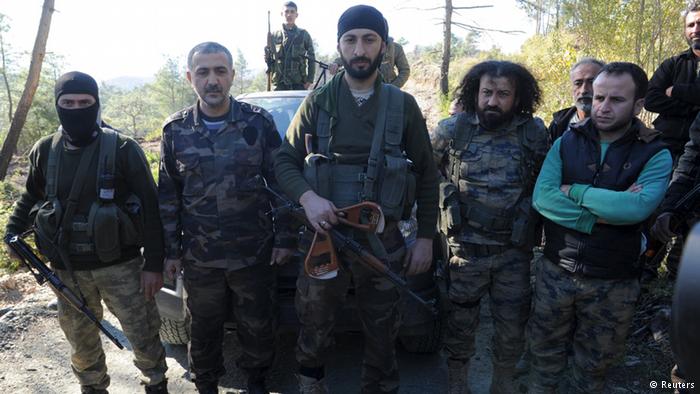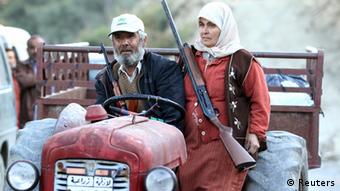As tensions rise between Ankara and Moscow, attention has shifted to an obscure ethnic group in the Middle East: the Turkmens of Syria. But who are the Turkmens and how do they fit into the ongoing war in the region?
On Tuesday [Nov. 24, 2015], Turkey shot down a Russian jet along its border with Syria, stoking fears that the conflict in the region could escalate. Turkish leaders have repeatedly accused Russia of violating its airspace, as well as targeting civilians in northern Syria.
According to Ankara, many of these civilians are part of the Syrian minority called Turkmens. Just last week, the Turkish Foreign Ministry summoned the Russian ambassador after a series of airstrikes in northern Syria wounded 40 members of the ethnic minority. On Monday, Ankara appealed to the UN Security Council to address the attacks on the group.
But who are the Turkmens? Why are they important to Ankara, and how do they pose a threat to Russia and the Syrian regime? DW spoke to experts on the Middle East and Turkey in order to understand what makes the Turkmen significant in the context of the ongoing crisis in the region.
Turkish ties
The Turkmen, a community based largely in the mountains of Latakia province in northern Syria, feel a close kinship with their neighbor to the north.
“There’s a strong sort of ethnic and linguistic affinity,” Paul T. Levin, director of the Stockholm University Institute for Turkish Studies, told DW. He said Turkmens speak a language that is related to Turkish and also share the same ethnicity.
Official statistics regarding the Turkmen population don’t exist, but many observers estimate there were around 200,000 in Syria before the start of the war. Fawaz Gerges, an expert on the Middle East and professor at the London School of Economics (LSE), told DW it is only natural that this small community looks to Ankara for “sponsorship” and “protection,” given their close heritage.
“In fact there’s nothing surprising whatsoever about the Turkmen community looking to Turkey for security,” Gerges said.
Strategic allies for Ankara
For Turkish President Recep Tayyip Erdogan, Turkmens are natural allies, not only due to their ethnic heritage, but also because they share a similar enemy: Syrian President Bashar al Assad.
Turkmen rebel groups took up arms against the Assad regime early on in the Syrian conflict, even though, according to Gerges, they didn’t experience the same kind of oppression felt by the Kurds during Assad’s rule.
Ankara has actively supported armed Turkmen groups – known as the Syrian Turkmen Brigades – in the fight against the Assad regime, even allowing them to enter and be based in Turkey, according to Levin. For this reason, the Turkmens are natural enemies of Russia, which backs Assad and began airstrikes in the country in late September to counter those seeking to topple him.
In addition, Levin said Turkmens, as well as other armed groups supported by Turkey, are essential for Erdogan’s government to maintain security along its border.
“Their continued control of Syrian territory, especially stretches of the Syrian-Turkish border, is of strategic importance to Turkey,” he said.
Players in a proxy war
Ranj Alaaldin, a Middle East expert and current doctoral researcher at LSE, told DW Turkey also wanted to use the Turkmen as a “potential buffer for any Kurdish autonomous region” along the border. The Kurds, another minority in Syria, have long pushed for their own state, something Ankara opposes.
Alaaldin said the Turkmen were “certainly a reliable proxy for Turkey, not just in Syria but also in other places like Iraq,” where they have been fighting the “Islamic State” (IS) terrorist organization.
For some of the experts, it was difficult to say what the endgame might be for the Turkmen.
Gerges suggested they are primarily seeking security as the social fabric of the Middle East continues to unravel. A close alliance with Turkey could provide them with that, he said.
“You need sponsorship, you need protection,” Gerges told DW. “[Turkey] is home for them, sociologically and emotionally.”
For original article on Deutsche Welle website see: http://www.dw.com/en/turkmens-an-ethnic-group-at-the-center-of-the-syrian-conflict/a-18876277?maca=en-RSS_en_Flipboard-9487-xml-media












